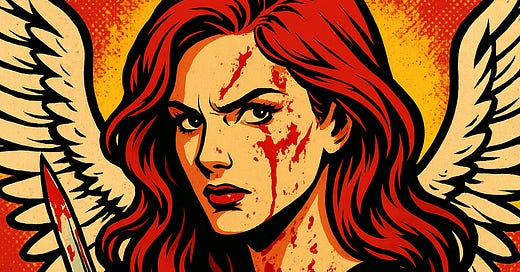Talk about a MINDF*CK!?!
This isn’t just a revenge story. It’s a psychological war wrapped in bloodstained justice and moral whiplash. (MINDF*CK 1-5, BY S.T. ABBY)
For my cinephiles: The Mindf*ck series is what you'd get if Dexter and Final Girl had a baby—then handed it a switchblade and a trauma file.* It has the cold precision of a serial killer, paired with the raw, righteous fury of a woman who’s survived the unthinkable. And if you squint, you’ll catch echoes of the movie Martyrs—not just in the gore, (oh and believe me there is gore) but in the way it frames suffering as a twisted form of transcendence. Don’t know what the hell I am talking about? Hear me out…
After years working in true crime TV, I’ve seen what real justice looks like—and on the real: it’s messy, brutal, and often happens way outside the courtroom. So here’s my question: when the system fails, where does the line fall between revenge, redemption, and justice ?
No book series better poses that question than the Mindf*ck series.
I read all five Mindf*ck books in 36 hours like I was cramming for the apocalypse. I couldn’t stop. It’s one of the best morally gray stories I’ve ever gotten my hands on—fast, brutal, and totally addictive. The chapter hooks are like, “Oh, you thought you were done reading for the night? That’s cute. Sit back down!”
Justice in this series isn’t clean or courtroom-approved—it’s messy, personal, and savage. And honestly? It felt right. Like someone finally flipped the script.
I can’t believe I’m saying this.
At its core, this series isn’t just a thrill ride—it’s a bloody, brilliant takedown of what happens when systems fail the vulnerable and no one is held accountable. It’s about power. Real power. Taking it back. Weaponizing it. Burning down the structures that protect predators and leave survivors behind. It makes you question everything—justice, revenge, forgiveness—and yeah, maybe even who deserves to die. (Cue Nervous Gulp.)
In today’s world, vigilante justice hits a nerve—because it feels like the only justice some people ever get. When the systems we’re told to trust—courts, cops, institutions—keep failing the vulnerable and protecting the powerful, the idea of someone stepping outside the rules and actually doing something becomes dangerously seductive.
And this is where Lana becomes more than just a character—she becomes a divine angel of death.
Ultimately, saints aren’t just shiny, untouchable figures. They’re martyrs who endure torture, pain, and moral darkness for a cause greater than themselves. They suffer so others don’t have to. They’re vessels of divine justice and mercy, walking through fire to restore balance between the broken and the holy.
Lana is that same force—only instead of enduring torture silently, she dishes it out with fierce precision. She’s the sharp-edged angel sent to reckon with those who’ve slipped through the cracks of earthly justice. Lana doesn’t just survive her trauma—she transcends it, wielding her pain like a weapon to punish predators and protect the powerless.
Her violence isn’t random or cruel—it’s sacred. It’s a brutal ritual that restores the natural balance in a world overwhelmed by corruption and impunity. In her, I see the paradox of divine wrath and mercy tangled into one lethal, unyielding force. Lana is justice when all other systems fail. I don’t endorse it. But, I get it.
Here is where I struggle: I’m Catholic. Like, guilt-in-my-bones Catholic. Raised on the gospel of forgiveness and the idea that vengeance belongs only to God. Watching Lana hunt down her abusers as a sexy, sharp-edged angel of death made me squirm and cheer at the same time. It’s a reckoning I didn’t expect to understand—but once I did, I saw why it had to happen.
It made me think to myself: Sometimes, restoring balance means confronting evil with equal force. Lana doesn’t destroy just to destroy—she dismantles the rot so something better can exist in its place. She’s not chaos for the sake of vengeance. She’s order, wielding darkness to clear the path for light. That at-least feels like what her intention is.
But if it takes blood to restore balance, what kind of world have we allowed to build—and are we ready to live in it?
Makes you think, right?
Lana’s not your typical heroine—darker, messier, and way more powerful. A saint forged in fire, an avenging angel handing out justice that’s as holy as it is savage. At least, that’s how I see it.
I loved this series. What about you?



